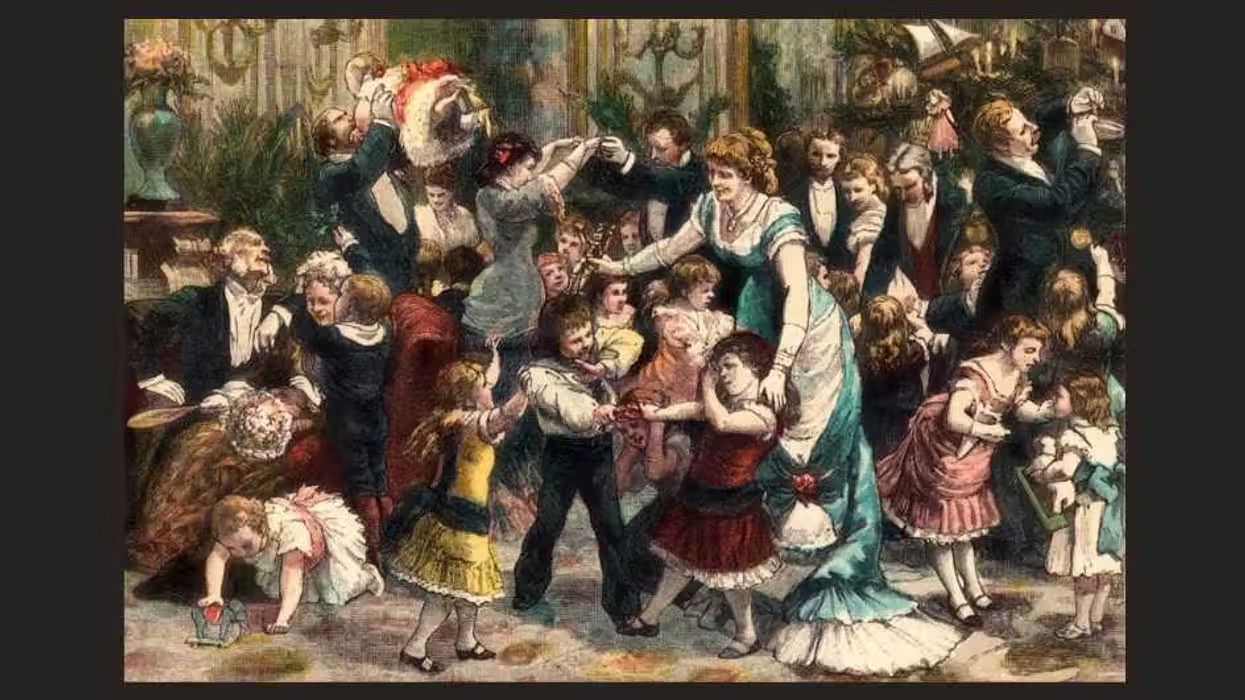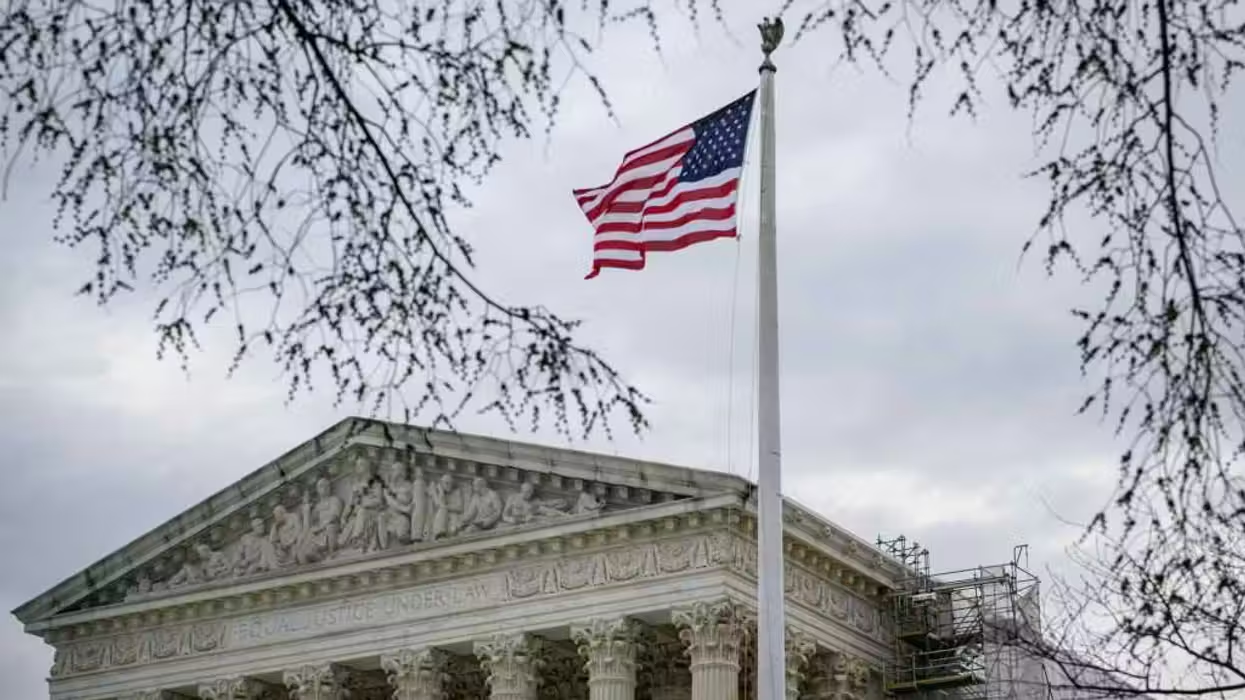© 2025 Blaze Media LLC. All rights reserved.
Why Do So Many Students Hate Capitalism and America? TheBlaze Speaks to Author of New Book That Criticizes Colleges for Teaching Victimhood
September 19, 2012
"This whole shebang is cartoonish. It is a caricature of education."
 Just one year ago, throngs of college students took to the streets, “occupying” Wall Street and bashing capitalism. What was it that lured so many? And at those demonstrations, why did we see so many strange bedfellows finding common cause – socialists, environmentalists, pro-Palestinian activists and others? Turns out those allies are not so mismatched after all, but are rather unified by the common perception – real or not - that they are victims of three evil isms: imperialism, colonialism, and capitalism. For many, that worldview was born and nurtured on our nation’s campuses.
Just one year ago, throngs of college students took to the streets, “occupying” Wall Street and bashing capitalism. What was it that lured so many? And at those demonstrations, why did we see so many strange bedfellows finding common cause – socialists, environmentalists, pro-Palestinian activists and others? Turns out those allies are not so mismatched after all, but are rather unified by the common perception – real or not - that they are victims of three evil isms: imperialism, colonialism, and capitalism. For many, that worldview was born and nurtured on our nation’s campuses.
In his latest book, “The Victims’ Revolution: The Rise of Identity Studies and the Closing of the Liberal Mind,” author Bruce Bawer takes to task American universities for their emphasis on Identity Studies – that is, Black Studies, "Queer Studies," Chicano Studies, Women’s Studies - which he believes inculcate into impressionable college students the idea that those minority groups are victims of the oppressive white man. This is the ethos rampant not only in those aforementioned departments but also in the study of literature, philosophy and history. In the past, humanities instruction focused on the great works, aspired to objective truths and emphasized the importance of logical analysis. Apparently, this is no longer the case. To Bawer, the higher education system is today predicated on moral relativity. No more focus on great works, or great men. Our youth are being taught to hate capitalism and to hate America and thus so many have bought into the tenets behind Occupy Wall Street.
The Wall Street Journal in its review of Bawer’s book wrote, “The most traditional branches of Western learning have been replaced by disciplines designed to serve radical political ends.”
Bawer describes the American college campus today as a dystopia, a world in which student and teacher alike present an air of being profound when really they say little that is new and even less that veers from the beliefs of their peers. It’s an exclusive -- and wildly expensive -- club with its own jargon and belief system, its own saints and sinners. If so many of them didn't deride faith, one might call it a religion.
Besides examining numerous texts in the various “identity” fields from which he generously quotes, Bawer also attended academic conferences, including one cultural studies conference, where he observed the speakers:
They’ve been trained to reduce the rich complexities and ambiguities of human life to simple formulas about oppressors and oppressed, capitalists and workers, Western imperialists and their Western victims. And when they encounter a reality that doesn’t fit into this paradigm, they don’t know how to deal with it, other than to make statements that are demonstrably untrue.
For Bawer, this world is also characterized by inconsistency. The white man and black man can exhibit the same behavior, yet the oppressor (you know which of the above) is always to blame. For example, he describes a reticence among feminists in Women’s Studies departments to criticize the oppression of Muslim women under Shariah law, including the wearing of hijab and honor killings. Since the Muslim world is to those academics in the “colonized” category, it is not to be condemned. He writes:
In humanities departments today, it is an article of faith that all civilizations are equal – except for Western civilization, which, students learn, is unique only in the degree of its greed, brutality, and lust for power.
Politics aside, this fashion in education has a high price. No more analyzing texts for their aesthetic and literary value. No more objective truth. After he graduated, Bawer believed “even the greatest literary works were treated as mere texts that had no more or less intrinsic value than a phone book or shopping list.” He writes:
Once, the purpose of the humanities had been to introduce students to the glories of Western civilization, thought and art – to enhance students’ respect, even reverence, for the cultural heritage of the West; now the humanities sought to umask the West as a perpetrator of injustice around the globe. Once, the great poets, authors, philosophers, historians, and artists of the Western canon had been heroes whose portraits and statues adorned university campuses; now they were to be viewed with a jaundiced eye-for most of them were, after all, Dead White Heterosexual Males, and therefore, by definition, members of an oppressive Establishment.
In fact, a field of study called Men’s Studies has appeared in about 100 colleges in North America. Bawer believes this is yet a new forum for white-male bashing.
The founding father of the field, Australian sociologist Robert W. Connell, based his writings on feminist theory and a belief that society teaches men to dominate women. In 2008, Connell had a sex-change operation and is now a woman. This raises questions about the integrity of his academic pursuit a decade earlier – while believing privately he was a woman on the inside - considering he “helped establish an academic discipline the entire point of which is that men are authoritarian bullies,” Bawer writes.
Opposite Men’s Studies, Male Studies later emerged as an alternative to the bias of the feminist-theory inspired Men’s Studies.
Robert Heasley, president of the American Men’s Studies Association took a swipe at Male Studies by employing what he presumably believes to be an insult, comparing the discipline to Glenn Beck. Bawer writes:
When Inside Higher Ed asked Heasley what he thought of Male Studies, he called it “a Glenn Beck approach” to the subject; the even more hostile comments about Male Studies by Women’s Studies professors make it clear that, in their view, the idea of a nonfeminist approach to the study of maleness is sheer heresy.
There seems to be no end to those groups which merit their own departments and courses of study. Bawer notes that recently Fat Studies has emerged as a new discipline as has Whiteness Studies which Bawer says emphasizes that “to be white is, in essence to be by definition an oppressor.”
To learn more about what inspired him to write this latest book, TheBlaze interviewed Bawer - who has previously written books challenging the left’s approach to gay issues and books on the threat of radical Islam to the West. Here is our conversation:
What inspired you to take on the American university education system in your latest book, “The Victims’ Revolution”?
I did it because there is a kind of brainwashing going on in the universities today that has already had deleterious effects on society at large – and because nobody else, surprisingly, had yet tried to explain to the intelligent common reader the exact nature of this brainwashing – the ideology, the background, the jargon, everything. Certainly nobody had yet spelled out the facts about identity studies, which are a huge part of the academy nowadays and which, in a way, epitomize the absurdity of what's going on in place of education in the humanities today.
What is your greatest concern about the higher education being offered to our youths today?
There are plenty of things, all connected. All too often, they're taught to think of themselves as members of groups and not individuals. Instead of learning to cherish the heritage of Western civilization and freedom, they learn to despise the West as the fount of all evil in the form of capitalism, colonialism, and imperialism. They learn that it is wrong for them, as Westerners, to criticize any aspect of any other culture, however horrible. And instead of learning them to think critically and independently and fearlessly, they're trained to become good little lockstep multiculturalists who are scared to articulate the obvious truths about certain things that are right in front of their noses. Morally, aesthetically, and intellectually, this is obviously a disaster.
What advice would you give those who – after hearing the alarm you are sounding -- would like their children to go to college and receive a top-notch education but are concerned about the ideological focus you describe in your book?
Don't go by the meaningless annual ratings that always place the same handful of world-famous universities at the top. Some of these places are the worst offenders. It can help to look at the website of the National Association of Scholars, which was founded in reaction to all this nonsense – there's a lot of information there that can give you an idea of which colleges to avoid and which ones at least allow some room for dissent. A few quick Google searches will help you find out which colleges have “Great Books” programs, Western civilization requirements, and the like, and which ones are dominated by identity-studies claptrap.
Is there a connection between what our youths are learning on campus today and the Occupy Wall Street demonstrations which began a year ago? After all, many of the participants have been college students, some even encouraged by their professors.
Absolutely. They've been taught that capitalism is the root of all the world's evil. They've been taught to despise it – and to despise the West, and especially America, and above all Wall Street. The history of the 20th century is one long lesson in the danger of rejecting democratic capitalism in favor of utopian economic schemes, but these young people, many of them very expensively educated, have apparently learned nothing about it at all.
The New York Times Book Review called “The Victims’ Revolution” out-of-date, unbalanced and a “caricature.” Would you like to answer that criticism?
Let me begin by pointing out that the reviewer for the New York Times, Andrew Delbanco, is hardly an objective observer. He is a faculty member at Columbia University, which is one of the greatest offenders when it comes to offering all this fashionable hokum. Among his newest colleagues there is Judith Butler, one of the founders of Queer Theory, and in the book I criticize both Butler and Queer Theory very severely. It may also be worth noting that I've written very critically in the past about Delbanco's work – so it's no surprise to see him trashing mine.
Delbanco's criticism is utterly disingenuous. Out of date? The book is based on reportage done within the last two years. Unbalanced? Meaning what? I wrote about what I saw and heard, and didn't exaggerate anything, and made a point of mentioning the rare instances in which identity-studies practitioners surprised me by actually disagreeing with the party line. A caricature? If the things I quote and describe make these people sound like cartoon characters, that's precisely the point – this whole shebang is cartoonish. It is a caricature of education.
Why did you decide to pay homage to Allan Bloom’s 1987 bestseller, “The Closing of the American Mind,” in choosing your subtitle – “The Closing of the Liberal Mind”?
Allan Bloom wrote the first prominent book to point out the way in which reason, objectivity, moral and aesthetic values, and a spirit of free inquiry were being supplanted in the academy by ideology and relativism. He described, and decried, an academic revolution; my book, coming along a quarter-century after his, examines what that revolution has wrought.
What remedies do you suggest for bringing American colleges back in sync with American values?
I think this can only be done at the grass roots. I write in the book about David Clemens, who teaches at one of the Cal State colleges. He has singlehandedly created an oasis on that campus for students who want a real education in literature, history, Western civilization. In order to establish his program, he had to take on his colleagues, who recognized his efforts as a threat to what they were doing. But he won. Students support him and sing his praises. He's turning that place around. Every college in the U.S. needs a David Clemens.
(H/T: FrontPage Magazine)
--
Related:
Want to leave a tip?
We answer to you. Help keep our content free of advertisers and big tech censorship by leaving a tip today.
Want to join the conversation?
Already a subscriber?
more stories
Sign up for the Blaze newsletter
By signing up, you agree to our Privacy Policy and Terms of Use, and agree to receive content that may sometimes include advertisements. You may opt out at any time.
Related Content
© 2025 Blaze Media LLC. All rights reserved.
Get the stories that matter most delivered directly to your inbox.
By signing up, you agree to our Privacy Policy and Terms of Use, and agree to receive content that may sometimes include advertisements. You may opt out at any time.






